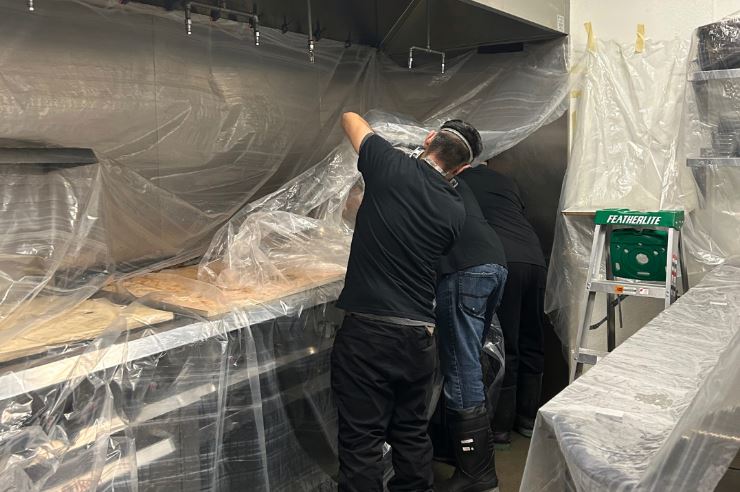In the bustling world of the restaurant industry, one integral yet often overlooked aspect of maintaining a safe and efficient kitchen is the regular cleaning of the hood system. An unclean hood can cause significant problems, ranging from reduced airflow and increased utility bills, to severe fire hazards.
Consequently, understanding the costs associated with hood cleaning is a necessity for any restaurateur. However, determining these costs can be a complex process, influenced by myriad factors such as the size of the hood, the frequency of cleaning, and the chosen service provider.
As we venture into an in-depth examination of the various influences on hood cleaning costs, we will also explore strategies for cost-effective maintenance and how to choose the right professional cleaning service, providing you with the knowledge to make informed decisions for your business. The insights we illuminate could play a pivotal role in maintaining the safety and profitability of your establishment.
Importance of Restaurant Hood Cleaning
The significance of regular restaurant hood cleaning cannot be overstated, playing a critical role in maintaining a safe, hygienic, and efficient kitchen environment. A neglected hood system can accumulate grease and other flammable substances, creating a substantial fire risk. Regular cleaning not only mitigates this hazard but also ensures compliance with local fire safety regulations, protecting your business from potential penalties and liabilities.
Moreover, a clean hood system promotes better airflow in the kitchen, reducing heat and improving the overall working conditions. It also reduces the risk of hazardous airborne contaminants, providing a healthier environment for both employees and customers.
The frequency of cleaning varies depending on the volume and type of cooking, but industry standards recommend a thorough clean at least every three months for high-volume kitchens. This regular investment in preventative maintenance can save significant costs in the long run, preventing potential system failures, costly repairs, and potential loss of business due to unexpected closures.
Factors Influencing Hood Cleaning Costs
While understanding the importance of regular hood cleaning in a restaurant setting is crucial, it’s equally critical to recognize the various factors that influence the cost of these cleaning services.
The first factor to consider is the size and complexity of the hood system. Larger, more intricate systems will require more time and resources to clean, thus increasing the cost. Similarly, the frequency of cleaning also influences the price. Regularly scheduled cleanings may garner a discount from service providers, as opposed to sporadic, one-off cleanings.
The type of restaurant and its cooking methods significantly affect hood cleaning costs as well. Restaurants with high-volume, greasy cooking operations, such as fast food establishments or steakhouses, will require more intensive cleaning than those with lighter cooking methods. This means more labor, and therefore, higher costs.
Ways to Minimize Cleaning Expenses
In the quest to maintain a clean and safe kitchen without straining the budget, restaurant owners can employ several strategies to manage and minimize hood cleaning expenses. These strategies do not only ensure adherence to health and safety standards, but also financial efficiency, a key ingredient in the recipe for a successful restaurant operation.
1. Regular Maintenance: By scheduling regular maintenance, potential issues can be identified and rectified before they escalate into costly repairs. Regular cleaning also extends the lifespan of the hood, reducing the need for a premature replacement.
2. DIY Surface Cleaning: While deep cleaning should be left to professionals, surface cleaning can be done in-house. This not only reduces the frequency of professional cleanings but also keeps the hood in good condition, minimizing repair costs.
3. Investing in Quality Equipment: High-quality equipment may have a higher upfront cost but tends to last longer and require less maintenance, thereby reducing long-term cleaning and repair costs.
Selecting a Professional Cleaning Service
Navigating through the myriad of professional cleaning services can often feel overwhelming, yet it is a crucial step in ensuring the longevity and efficiency of your restaurant hood. It’s essential to choose a service that specializes in commercial kitchen exhaust systems, as they will be familiar with the specific requirements and standards set by the National Fire Protection Association.
Consider their reputation and experience within the industry. Check online reviews and solicit referrals from other restaurant owners. Additionally, ensure the service is licensed and insured, providing a layer of protection should any problems arise during the cleaning process.
An essential aspect of the selection process is cost. Rates vary, so obtaining multiple quotes is beneficial. However, beware of services offering significantly lower prices, as they may cut corners or lack quality.
Lastly, look for a service that offers a comprehensive cleaning process, including the hood, ductwork, and fan. They should also provide before-and-after photos as proof of work. Remember, regular professional cleaning is not just a regulatory requirement, but also a preventative measure against potential fire hazards, maintaining a safe and efficient kitchen. Therefore, investing time and resources in selecting a reliable professional cleaning service is indispensable.
Regular Maintenance and Cost Savings
Once you’ve enlisted a dependable professional for hood cleaning, it’s essential to set up a consistent maintenance routine. This proactive approach not only guarantees the safety and efficiency of your restaurant’s hood but can also yield substantial cost savings over time. Regular upkeep of the hood system is paramount in averting expensive repairs and replacements, ultimately extending its lifespan and preserving its functionality.
1. Preventive Maintenance: Regular cleaning and inspection can identify potential issues before they escalate into costly repairs or replacements. It can also extend the lifespan of your restaurant hood, saving you the expense of a premature replacement.
2. Energy Efficiency: A clean and well-maintained hood system operates more efficiently. It reduces energy consumption, which can significantly decrease your utility costs.
3. Compliance with Regulations: Regular maintenance ensures your hood system complies with local fire and health regulations. Non-compliance can result in hefty fines or even closure of your restaurant.
The Importance of Hood Cleaning Certification: A Comprehensive Guide

